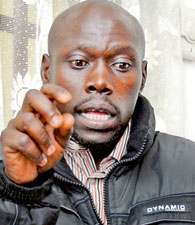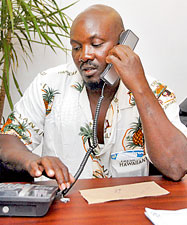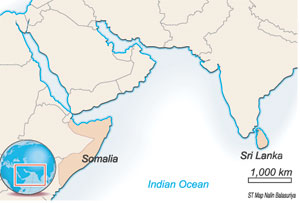The Kenyan made his first call in 14 months to his wife from a local trade union office at Lauries Road in Bambalapitiya on Wednesday afternoon.
Kyalo Ndola 43, father of six and a resident of Mombaza in Kenya, was among the 27 foreign fishermen who docked at Colombo harbour during the early hours on Wednesday this week, after eight months as captives of Somali pirates.
Tired, helpless and close to starvation, the group comprising Chinese, Indonesians, Kenyans, Vietnamese and Filipinos arrived in Colombo, eight days after they were released from the pirate stronghold of Garad on the Somali coast, and immediately begged for food, clean water and medical attention.
 |
 |
| Kenyan Mitan Makau recalling their ordeal |
Kyalo Ndola makes his first call home after 14 months. |
The Taiwan registered fishing trawler Yuh Far 227 and its crew sailed out of a Singapore fishing harbour in early October 2009 and steamed towards the Indian ocean.
The craft was a long-stay boat meant for professional fishing in the deep seas. All the men on board were hardened fishermen.
“We had been at sea for eight months since we left Singapore, casting our nets in different locations in the Indian Ocean. A Japanese collection vessel would visit us every month and take over our catch, which they would store in large freezers in the lower deck,” said fellow Kenyan Mitan Makau who hails from Nairobi.
“It was around 5.30 p.m. when we spotted a dinghy approaching the fishing vessel at high speed. It was packed with men armed to the teeth. Their weapons included AK 47 assault rifles, mortars, bazookas and hand grenades strung around their necks.”
“At first we did not panic. We thought it was a naval patrol from either India or Sri Lanka. But as the craft neared our vessel, it was evidently clear who these people were. “We had heard of sea pirates known to infest these waters, hunting for large commercial vessels to hijack for ransom in millions of dollars for their release. Since our vessel was a fishing trawler, the pirate scare never bothered us, until that day on May 7, 2010,” Makau added.
“They boarded the vessel with ease and herded all of us onto the deck at gunpoint. We were rudely informed that it was a hijacking and the captain was ordered to weigh anchor and sail towards the Somali coast. Eight days and 1,300 miles later, we reached the pirate stronghold of Garad. “We were soon to learn that the pirates had no interest in any ransom, since it was a fishing craft of little or no value. But the pirates had another devious plan.
“During our entire duration in captivity, they used our fishing craft as a vessel in distress to lure and successfully hijack six vessels close to Sri Lankan waters. “The pirates used a simple modus operandi. They hid their dinghy on our boat, and ordered us to send out distress signals to other vessels in the area. Unaware of the lurking danger, a ship would respond to our call, only to have the armed pirates board the vessel and take it under their command at gunpoint.
“This exercise went on for eight long months, until the pirates decided to free us along with our trawler, and we headed for the nearest port that is Colombo. “However, before letting us go, they stripped us of all our valuables, from wrist watches to rings and cell phones, even our clothes. Here we are in a strange city, totally broke and helpless,” Makau lamented.
Stepping in to give a helping hand was the National Union of Seafarers, Sri Lanka (NUSS) an international grouping that acts as a watchdog of the interests of seaman worldwide.
NUSS Secretary Palitha Athukorale said that they had already traced the local agent of the Taiwan fishing company and the response has been encouraging.
The agent had already made arrangements to provide the crew with food, medicines and other basic requirements until the crew receives their wages from Taipei. Local agent Shiran Fernando said that the vessel will remain at the Colombo Port for at least another two months, since there are several formalities to be completed.
He said he was in touch with the head office in Taipei with regard to the crew’s wages and other related matters such as their air tickets, etc.
He said that initially, the crew would receive a part payment prior to leaving to their respective countries, with the balance to be collected from the local agent in their respective countries.
He also said that there was concern for their health, with most of them suffering from mental fatigue, so much so that, a Kenyan is presently receiving treatment at a private hospital in Colombo for loss of memory.
He cannot even recognize or remember the names of his mates, but latest reports say that he his recovering, Mr. Fernando further added.In addition, the International Transport Workers Federation (ITF) is also working on the matter.Local ITF representative Ranjan Perera said that he had already got in touch with his London office, which would be dealing directly with the owner of the fishing vessel.
According to Mr Perera, the fishing vessel will not be allowed to leave Colombo until the entire crew is in receipt of their total dues including compensation under international maritime laws.
Coastguard chief calls for
foreign assistance to tackle pirates
Somali and other foreign pirates are riding the waves within Sri Lanka’s Exclusive Economic Zone (EEZ) that extends to some 2,000 miles, and moves are underway to seek international assistance in putting down the scourge, Coastguard Chief, Rear Admiral Daya Dharmapriya told the Sunday Times yesterday.
“This is an international scam that begins with the pirates who are backed by several stakeholders including various groups individuals, and in some instances even governments-- the list could be very long,” he said..
“This is an issue that we cannot tackle alone. We will need foreign assistance,” Mr. Dharmapriya stressed.
He said that the pirates were also known to, at times, come close to the 12-mile territorial waters of the country. |




